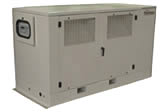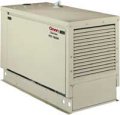Natural Gas Powered Electric Generators
Natural Gas is the fuel of choice to operate emergency generators with. Natural Gas is clean burning, readily available in many
neighborhoods, and since natural gas pipelines are underground they are usually not affected by the elements or mechanical
disruptions that cause most residential power outages. For these reasons, emergency generator manufacturers usually make this
fuel option as a primary fuel source on their outside premise installed home stand-by generator models. Where a homeowner is already
using natural gas for heating, cooking, or other uses, the use of a natural gas powered electric generator is always a good idea! The
photo above gives you a good idea of what such a unit would look like.


Home Backup Generators
Natural gas is the fuel of choice to operate home standby generators, sometimes called "home backup generators", the vast majority are powered by Natural Gas as a fuel. This is due to the widespread availability of Natural Gas in many residential neighborhoods. Since these units are installed outside the residence
they have ready access to the existing fuel lines. Where natural gas does not exist in a neighborhood the homeowner may
decide to install a large propane gas tank that can be periodically refilled by a local gas vendor.
Several manufacturers provide these type of generators, such as: Coleman, Generac, Guardian,
Onan, and Briggs & Stratton. Click on the links (left) to the brand of your choice to review their models.
Additionally you may want to know about LPG (liquid propane gas) powered generators.
Portable Generators
Portable generators are "generally" powered by either gasoline or diesel fuel as they come from the manufacturer.
There are however; some conversions kits available that can be installed in order to make these units operate on propane (LPG) gas, or natural gas.
We believe that the use of natural gas through such a conversion might be impractical for a portable generator. . Owners should be aware that
installing these conversion kits should be done only by an experienced and qualified repair technician
and that in some case the conversion will void the original manufacturer's warranty. Please consider these factors before you
decide to "convert" any generator to operate on natural gas or propane.
Industrial Generators
Industrial generators generally run on diesel fuel, but some can be powered by Natural Gas depending upon the application and setup.
These units are usually engineered specifically for their particular application. The manufacturer can assist you with unit configuration.
Benefits of Natural Gas
Natural gas has long been the favorite with homeowners.
It's clean...
Natural gas is the cleanest of all fossil fuels and is simply the best energy choice for the environment — inside and outside your home.
It's domestic...
Aproximately 99% of the gas we use in the USA comes from North America ~ 84% from the U.S.* Increased use of natural gas can reduce our dependence on oil imported from the Middle East.
It's economical...
Natural gas appliances are virtually maintenance-free and that means additional savings.
It's efficient...
When the entire cycle of producing, processing, transporting and using energy is considered, natural gas is delivered to you with a "total energy efficiency" of about 90%. Moreover, gas appliances and equipment are extremely efficient.
It's multi-purpose...
It can heat your entire home, make your hot water, dry your clothes and help you cook your meals in the oven or on the barbecue grill. New residential uses range from fireplaces and air conditioners to microturbines and fuel cells, and (of course) home standby generators!
It's dependable...
You never have to worry about weather, delivery schedules or running out.
In 1999, 70 percent of newly constructed single-family homes used natural gas for space heating, compared with 47 percent in 1986*.

